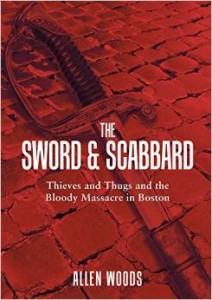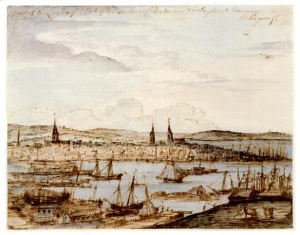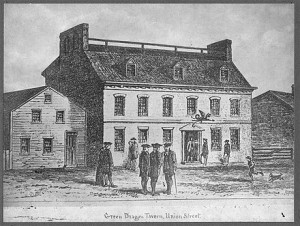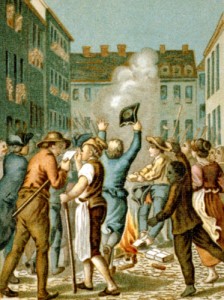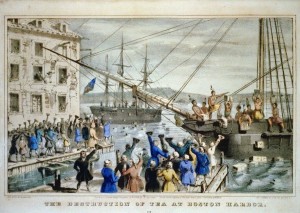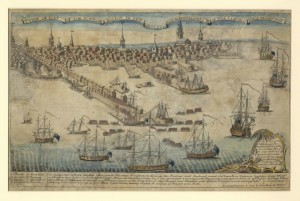I was recently invited to read and review a debut historical novel, The Sword and Scabbard, set in eighteenth-century Boston on the verge of the American Revolution. Today I’m giving my review of the book here. My next blog will include an illuminating interview with its author, Allen Woods.*
When we first meet Nicholas Gray (not his real name), protagonist of Allen Woods’ historical novel The Sword and Scabbard, he is still shy of thirty but has received enough knocks from life to make him wary of where he walks and pragmatic to the point of cynicism.
The year is 1766. Gray has taken an unintended and roundabout route to the colonies from his birthplace in Oxford, where he was orphaned at eleven. Deriving little joy when working as a maltreated child servant in London or from being pressed into the Royal Navy at sixteen, he survived the Battle of Quiberon Bay and began Caribbean patrol duties on his ship, the Dover. Bad dreams and a constitutional dislike of taking orders disinclined him to continue that life. Unfortunately, Gray’s escape from His Majesty’s Service in Kingston Harbor has now left him a double candidate for hanging, whether on account of desertion or murder. Stowed away in the hold of a molasses ship, when he arrives in Boston, he learns that the Dover has foundered in a storm. With all aboard who might know of his crimes reported lost, Gray sees a chance to start life afresh, with a clean slate.
Social, economic and political unrest are already rife in pre-revolutionary Boston. Almost everyone, from rich to poor and in every walk of life, seems to be on the make. Since many are also aggressively inclined, Gray must continue look over his shoulder and into the shadows whenever he traverses the harbor’s dark alleys. And these are to become his regular hunting ground as he continues to skirt the law, searching for a personal sweet spot within Boston’s murky but lucrative web of smuggling and customs avoidance.
Nicholas has also quickly found legitimate work and begun serving – in more ways than one – former moll and blue-eyed Widow McGowan, who holds the license of the Sword and Scabbard tavern at the North End of Boston Harbor.
More drawn to Maggie than he feels comfortable to admit, Gray’s reticence to signal commitment to more than the pleasures of his landlady’s bed creates an awkward push-pull in their developing relationship; a dynamic also mirrored by his unwillingness to throw in his lot with revolutionaries when wooed by the Sons of Liberty.
Since he is even less inclined to cozy up to Tories and the rich Boston merchants and customs officials who are variously lining their pockets, Gray continues to opt for an independent path of small-time crime. His intelligence, experience and personality make him a natural leader for a motley coterie that has collected around The Sword and Scabbard, and with whom he haltingly builds some sense of loyalty to ‘family’.
Gray tries not to tangle with trouble, but it has a habit of finding him. He makes unsavory and dangerous new enemies and, when his Sugar Islands past also catches up with him, his personal drama explodes, just as Boston lurches toward a conflagration that will set the Revolution alight. In such a rapidly polarizing and violent environment, Nicholas Gray must come down off his fence and decide which camp and relationships he intends to serve.
This is Allen Woods’ first historical novel and I found it both entertaining and educational. Woods is a freelance writer and editor, and his technical skills show to great advantage in a tightly written and well-paced story. He also displays detailed knowledge and an impartial perspective while interweaving political, social and economic threads into a complex tapestry of New England on the edge of revolution.
Woods manages to create convincing context while avoiding the pitfalls of serving up a dry lesson in US history. His evocative pen pictures of Boston’s late 18th-century harbor world are matched by equally deft descriptions of believable, if not always endearing, characters.
On occasion while reading The Sword and Scabbard, I found myself wanting to shake Nicholas Gray and challenge what felt like a stubborn, at times verging on deliberately obtuse, illiteracy in matters of the heart. The novel grants only an occasional, and relatively restrained glimpse of feminine perspectives, but I suspect that the two women who succumbed to Gray’s physical charms may also have felt more than once like screaming at him to wake up.
Of course, eleven years old is too young to be orphaned in any place or period of history, and we know Gray has led the kind of existence that gives him reason, if not a continuing excuse, to remain suspicious in the face of proffered affection. He also acknowledges his shortcomings. So any such discomfort with the protagonist speaks to my natural bias rather than to the integrity of the story. Allen Woods brings his characters and scenes powerfully to life through Gray’s first person accounts of external appearances and pragmatic assumptions about how and why the people around him behave and interact as they do.
This novel begs to be read by all who enjoy a cracking good yarn, with a central protagonist willing to put himself in the way of all manner of physical danger, while remarkably reserved when it comes to running risks with his heart.
The Sword and Scabbard also represents a view from the docklands and from ‘the little people’, accompanied by a balanced overarching perspective on pre-revolutionary society that is often missing from historical accounts I have read and seen. As such, it provides a realistic and refreshing antidote to some excessive portraits of idealism, heroism and even occasional saintliness among the early instigators of revolution.
When I had finished the novel, I found myself feeling I was at the beginning, not just in terms of the American Revolution but also with regard to Nicholas Gray’s emotional journey. I also reflected that Nicholas had known love and good parenting in his first eleven years. It occurred to me that maybe his heart can thaw with constant and caring companionship, and a more multi-dimensional trusting and trustworthy protagonist may develop and emerge, if and when Nicholas Gray returns.
I hope that, in whatever guise his author decides for him, Gray will indeed be back some day, for Allen Woods’ debut novel promises to be the first of a series, and it will be interesting to see how such a colorful cast of characters fares, as the American Revolution gathers momentum.
You can purchase The Sword and Scabbard direct from Allen Woods’ website at: http://www.theswordandscabbard.com or at Amazon: http://www.amazon.com/Sword-Scabbard-Thieves-Bloody-Massacre/dp/0990884104/ref=sr_1_1?s=books&ie=UTF8&qid=1433197306&sr=1-1&keywords=The+Sword+and+Scabbard
If you fancy orienting yourself to the neighborhood as you read the story, I recommend you use the map on a great website created by a collaboration between The Bostonian Society and the New England Arts and Architecture Program at Wellesley College: http://www.bostonhistory.org/sub/mappingrevolutionaryboston/
* I received a free copy of The Sword and Scabbard for review purposes. I received no remuneration for this review.

